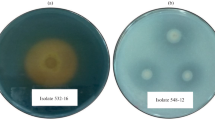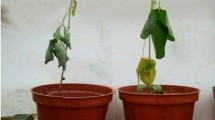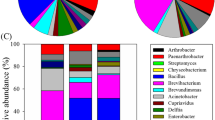Abstract
Salinity and drought stress pose critical challenges to crop productivity, including roselle (Hibiscus sabdariffa L.). Using waste agriculture as a natural source of fertilizer to promote the activity of beneficial soil microorganisms has the potential to help agriculture in abiotic stress-affected areas by increasing plant nutrient uptake and ecological sustainability. We investigate the ability of BioSoy+ biofertilizer, which contains salt and drought stress-tolerant plant-growth-promoting rhizobacteria (PGPR) and soybean meal, to improve roselle growth under unfavorable conditions. Rhizobacteria tolerant to salt and drought stress were isolated, and evaluated for growth-promoting traits and pathogen inhibition under stress, and their identity confirmed by 16s rRNA gene sequencing. The impact of BioSoy+ on roselle growth and soil stability index during salt and drought stress was evaluated. Salt- and drought-tolerant PGPR strains Pseudomonas nicosulfuronedens AP01 and Bacillus velezensis CC03 were identified as the major component for biofertilizers. Under 2% NaCl stress, Pseudomonas nicosulfuronedens AP01 displayed outstanding phosphate solubilization and robust Sclerotium rolfsii pathogen suppression. BioSoy+ biofertilizer application significantly enhanced roselle growth under salt and water-limited conditions. BioSoy+ treatment, for example, boosted biomass by 194.74% and 68.29% at 25% field capacity and 100 mM NaCl conditions, respectively. BioSoy+ also increased relative water content, microbial activity, proline accumulation, and chlorophyll content, indicating stress reduction and better photosynthetic efficiency. This study highlights the importance of PGPR in alleviating the negative impacts of salt and drought stress. Furthermore, it emphasizes the feasibility of soybean meal as a biofertilizer carrier, fostering sustainable agricultural practices.
Graphical abstract

Highlights
-
Pseudomonas nicosulfuronedens AP01 and Bacillus velezensis CC03 demonstrated plant-growth-promoting abilities under salt and drought stress conditions.
-
BioSoy+, a PGPR-soybean meal biofertilizer, improved the stability index of soil.
-
BioSoy+ application significantly increased overall plant health of roselle under salt and water-limitation conditions.
-
BioSoy+ treatment reduced proline accumulation and enhanced chlorophyll content in roselle leaves, indicating stress alleviation and improved photosynthetic efficiency.






Similar content being viewed by others
Data Availability
Isolate CC03 and AP01 have been deposited in NCBI with the accession numbers OR304306.1 and OR304305.1, respectively. Pseudomonas nicosulfuronedens strain CC03 (16s rRNA, partial sequence) can be found at https://www.ncbi.nlm.nih.gov/nuccore/OR304306.1, and Bacillus velezensis strain AP01 (16s rRNA, partial sequence) at https://www.ncbi.nlm.nih.gov/nuccore/OR304305.1.
References
Abbasi S, Sadeghi A, Safaie N (2020) Streptomyces alleviate drought stress in tomato plants and modulate the expression of transcription factors ERF1 and WRKY70 genes. Sci Hortic (amsterdam). https://doi.org/10.1016/J.SCIENTA.2020.109206
Aloo BN, Makumba BA, Mbega ER (2020) Plant growth promoting rhizobacterial biofertilizers for sustainable crop production: the past, present, and future. Front Plant Sci 13:1002448. https://doi.org/10.20944/PREPRINTS202009.0650.V1
Al-Sayed HM, Hegab SA, Youssef MA et al (2020) Evaluation of quality and growth of roselle (Hibiscus sabdariffa L.) as affected by bio-fertilizers. J Plant Nutr 43:1025–1035. https://doi.org/10.1080/01904167.2020.1711938
Annapurna K, Govindasamy V, Ajit V, Choudhary DK (2019) Mitigation of drought stress in wheat crop by drought tolerant endophytic bacterial isolates. Vegetos 32:486–493. https://doi.org/10.1007/s42535-019-00060-1
Bagheri N, Ahmadzadeh M, Mariotte P, Jouzani GS (2022) Behavior and interactions of the plant growth-promoting bacteria Azospirillum oryzae NBT506 and Bacillus velezensis UTB96 in a co-culture system. World J Microbiol Biotechnol 386(38):1–12. https://doi.org/10.1007/S11274-022-03283-8
Barin M, Asadzadeh F, Hosseini M et al (2022) Optimization of biofertilizer formulation for phosphorus solubilizing by Pseudomonas fluorescens Ur21 via response surface methodology. Processes. https://doi.org/10.3390/PR10040650
Bates LS, Waldren RP, Teare ID (1973) Rapid determination of free proline for water-stress studies. Plant Soil. https://doi.org/10.1007/BF00018060
Batool T, Ali S, Seleiman MF et al (2020) Plant growth promoting rhizobacteria alleviates drought stress in potato in response to suppressive oxidative stress and antioxidant enzymes activities. Sci Rep 101(10):1–19. https://doi.org/10.1038/s41598-020-73489-z
Berza B, Sekar J, Vaiyapuri P et al (2022) Evaluation of inorganic phosphate solubilizing efficiency and multiple plant growth promoting properties of endophytic bacteria isolated from root nodules Erythrina brucei. BMC Microbiol. https://doi.org/10.1186/S12866-022-02688-7
Cocco A, Pacheco da Silva VC, Benelli G et al (2021) Sustainable management of the vine mealybug in organic vineyards. J Pest Sci 94:153–185. https://doi.org/10.1007/S10340-020-01305-8
Correa-García S, Pande P, Séguin A et al (2018) Rhizoremediation of petroleum hydrocarbons: a model system for plant microbiome manipulation. Microb Biotechnol 11:819. https://doi.org/10.1111/1751-7915.13303
Das P, Nutan KK, Singla-Pareek SL, Pareek A (2015) Understanding salinity responses and adopting ‘omics-based’ approaches to generate salinity tolerant cultivars of rice. Front Plant Sci. https://doi.org/10.3389/fpls.2015.00712
Egamberdieva D, Wirth S, Bellingrath-Kimura SD et al (2019) Salt-tolerant plant growth promoting rhizobacteria for enhancing crop productivity of saline soils. Front Microbiol. https://doi.org/10.3389/FMICB.2019.02791/FULL
Essalimi B, Esserti S, Rifai LA et al (2022) Enhancement of plant growth, acclimatization, salt stress tolerance and verticillium wilt disease resistance using plant growth-promoting rhizobacteria (PGPR) associated with plum trees (Prunus domestica). Sci Hortic (amsterdam). https://doi.org/10.1016/j.scienta.2021.110621
Fitzpatrick CR, Copeland J, Wang PW et al (2018) Assembly and ecological function of the root microbiome across angiosperm plant species. Proc Natl Acad Sci U S A 115:E1157–E1165. https://doi.org/10.1073/pnas.1717617115
Ghosh UK, Islam MN, Siddiqui MN, Khan MAR (2021) Understanding the roles of osmolytes for acclimatizing plants to changing environment: a review of potential mechanism. Plant Signal Behav. https://doi.org/10.1080/15592324.2021.1913306
Gordon SA, Weber RP (1951) Colorimetric estimation of indoleacetic acid. Plant Physiol. https://doi.org/10.1104/pp.26.1.192
Gowtham HG, Singh B, Murali M et al (2020) Induction of drought tolerance in tomato upon the application of ACC deaminase producing plant growth promoting rhizobacterium Bacillus subtilis Rhizo SF 48. Microbiol Res 234:126422. https://doi.org/10.1016/J.MICRES.2020.126422
Gupta A, Rai S, Bano A et al (2022) ACC deaminase produced by PGPR mitigates the adverse effect of osmotic and salinity stresses in Pisum sativum through modulating the antioxidants activities. Plants (basel, Switzerland). https://doi.org/10.3390/PLANTS11243419
Htwe AZ, Moh SM, Soe KM et al (2019) Effects of biofertilizer produced from Bradyrhizobium and Streptomyces griseoflavus on Plant growth, nodulation, nitrogen fixation, nutrient uptake, and seed yield of mung bean, cowpea, and soybean. Agronomy 9:77. https://doi.org/10.3390/AGRONOMY9020077
Hwangbo K, Um Y, Kim KY et al (2016) Complete genome sequence of Bacillus velezensis CBMB205, a phosphate-solubilizing bacterium isolated from the rhizoplane of rice in the Republic of Korea. Genome Announc. https://doi.org/10.1128/GENOMEA.00654-16
James C, Swaggerty C, Bischoff KM et al (2016) Evaluation and selection of Bacillus species based on enzyme production, antimicrobial activity, and biofilm synthesis as direct-fed microbial candidates for poultry. Front Vet Sci. https://doi.org/10.3389/fvets.2016.00095
Javed H, Riaz A, Qureshi A et al (2020) Isolation, characterization and screening of PGPR capable of providing relief in salinity stress. Eurasian J Soil Sci 9:85–91. https://doi.org/10.18393/EJSS.650546
Jhuma TA, Rafeya J, Sultana S et al (2021) Isolation of endophytic salt-tolerant plant growth-promoting rhizobacteria from Oryza sativa and evaluation of their plant growth-promoting traits under salinity stress condition. Front Sustain Food Syst 5:250. https://doi.org/10.3389/FSUFS.2021.687531/BIBTEX
Kaur H, Kaur L, Singh A (2019) Professor a medical uses of Hibiscus sabdariffa (roselle) (Print). Int J Life Sci Res 7:449–457
Kim SY, Song H, Sang MK et al (2017) The complete genome sequence of Bacillus velezensis strain GH1-13 reveals agriculturally beneficial properties and a unique plasmid. J Biotechnol 259:221–227. https://doi.org/10.1016/J.JBIOTEC.2017.06.1206
Kumar A, Kumar A, Pratush A (2014) Molecular diversity and functional variability of environmental isolates of Bacillus species. Springerplus 3:1–11. https://doi.org/10.1186/2193-1801-3-312
Kumari B, Singh G, Gautam A et al (2023) Enhancement in Ni–Cd phytoremediation efficiency of Helianthus annuus L. from battery waste contaminated soil by bacterial augmentation, isolated from e-waste contaminated sites. Int J Environ Res 17:18. https://doi.org/10.1007/s41742-023-00508-y
Liu L, Ma L, Zhu M et al (2023) Rhizosphere microbial community assembly and association networks strongly differ based on vegetation type at a local environment scale. Front Microbiol 14:1–13. https://doi.org/10.3389/fmicb.2023.1129471
Mohamed BB, Sulaiman AA, Dahab AA (2012) Roselle (Hibiscus sabdariffa L.) in Sudan, cultivation and their uses. Bull Environ Pharmacol Life Sci 1(6):48–54
Moradi F, Ismail AM (2007) Responses of photosynthesis, chlorophyll fluorescence and ROS-scavenging systems to salt stress during seedling and reproductive stages in rice. Ann Bot 99:1161. https://doi.org/10.1093/AOB/MCM052
Morcillo RJL, Manzanera M (2021) The effects of plant-associated bacterial exopolysaccharides on plant abiotic stress tolerance. Metabolites 11:337. https://doi.org/10.3390/METABO11060337
Naseem H, Ahsan M, Shahid MA, Khan N (2018) Exopolysaccharides producing rhizobacteria and their role in plant growth and drought tolerance. J Basic Microbiol 58:1009
Nautiyal CS (1999) An efficient microbiological growth medium for screening phosphate solubilizing microorganisms. FEMS Microbiol Lett 170:265–270. https://doi.org/10.1016/S0378-1097(98)00555-2
Nhi Y, Theerakulpisut P, Riddech N (2023) Pesticide tolerant rhizobacteria isolated from rice (Oryza sativa) overcomes the effects of salt and drought stress in pesticide contaminated condition. Plant Soil 490:521–539. https://doi.org/10.1007/s11104-023-06098-0
Niu X, Song L, Xiao Y, Ge W (2018) Drought-tolerant plant growth-promoting rhizobacteria associated with foxtail millet in a semi-arid and their potential in alleviating drought stress. Front Microbiol 8:2580. https://doi.org/10.3389/FMICB.2017.02580/BIBTEX
Palta JP (2009) Leaf chlorophyll content. Remote Sens Rev 5:207–213. https://doi.org/10.1080/02757259009532129
Qin P, Wang T, Luo Y (2022) A review on plant-based proteins from soybean: health benefits and soy product development. J Agric Food Res 7:100265. https://doi.org/10.1016/j.jafr.2021.100265
Ramamoorthy V, Viswanathan R, Raguchander T et al (2001) Induction of systemic resistance by plant growth promoting rhizobacteria in crop plants against pests and diseases. Crop Prot 20:1–11. https://doi.org/10.1016/S0261-2194(00)00056-9
Safari M, Motamedi E, Kari Dolatabad H, Modarres Sanavy SAM (2020) Nano-carriers effects on the viability and efficiency of Pseudomonas strains as phosphate solubilizing bacteria. Heliyon 6:e05076. https://doi.org/10.1016/j.heliyon.2020.e05076
Siddique M, Sultana J, Abdullah M (2017) Aggregate stability: an indicator of quality and resistivity of arable soil. Asian J Soil Sci Plant Nutr 1:1–7. https://doi.org/10.9734/AJSSPN/2017/34829
Torsvik V, Salte K, Sørheim R, Goksøyr J (1990) Comparison of phenotypic diversity and DNA heterogeneity in a population of soil bacteria. Appl Environ Microbiol 56:776–781
Vocciante M, Grifoni M, Fusini D et al (2022) The role of plant growth-promoting rhizobacteria (PGPR) in mitigating plant’s environmental stresses. Appl Sci 12:1231. https://doi.org/10.3390/APP12031231
Wang C, Zhao D, Qi G et al (2020) Effects of Bacillus velezensis FKM10 for promoting the growth of Malus hupehensis Rehd. and inhibiting Fusarium verticillioides. Front Microbiol 10:497500. https://doi.org/10.3389/FMICB.2019.02889/BIBTEX
Wang A, Luo X, Li X et al (2023) Bioaugmentation of woodchip bioreactors by Pseudomonas nicosulfuronedens D1–1 with functional species enrichment. Bioresour Technol 385:129309. https://doi.org/10.1016/j.biortech.2023.129309
Xa LT, Nghia NK (2020) Antagonistic activity against plant pathogenic fungus by various indigenous microorganisms from different cropping systems in Soc Trang Province, Vietnam. Environ Nat Resour J 18:249–256. https://doi.org/10.3252/ennrj.18.3.2020.23
Xu T, Zhu T, Li S (2016) β-1,3-1,4-glucanase gene from Bacillus velezensis ZJ20 exerts antifungal effect on plant pathogenic fungi. World J Microbiol Biotechnol. https://doi.org/10.1007/S11274-015-1985-0
Yoshiki M, Sachie H, Toshihide M, Motoki K (2013) Soybean as a nitrogen supplier. A Compr Surv Int Soybean Res Genet Physiol Agron Nitrogen Relatsh. https://doi.org/10.5772/51017
Zdunek-Zastocka E, Grabowska A, Michniewska B, Orzechowski S (2021) Proline concentration and its metabolism are regulated in a leaf age dependent manner but not by abscisic acid in pea plants exposed to cadmium stress. Cells. https://doi.org/10.3390/CELLS10040946/S1
Acknowledgements
We express our heartfelt gratitude to the Scholarship of Khon Kaen University (Thailand) for their generous financial support. This project was conducted as part of the Plant Genetic Project under The Royal Initiative of Her Royal Highness Princess Maha Chakri Sirindhorn at Khon Kaen University which was supported by the Fundamental Fund of Khon Kaen University and the National Science, Research and Innovation Fund (NSRF), Thailand under the Grant Number FRB650032/0161. Special thanks go to the Salt-tolerant Rice Research Group and the members of the Microbial Fertilizer Laboratory, Faculty of Science, Khon Kaen University, for their invaluable assistance and support in this endeavor.
Author information
Authors and Affiliations
Corresponding author
Ethics declarations
Conflict of interest
The authors declare that they have no known competing financial interests or personal relationships that could have appeared to influence the work reported in this paper.
Rights and permissions
Springer Nature or its licensor (e.g. a society or other partner) holds exclusive rights to this article under a publishing agreement with the author(s) or other rightsholder(s); author self-archiving of the accepted manuscript version of this article is solely governed by the terms of such publishing agreement and applicable law.
About this article
Cite this article
Riddech, N., Ma, Y.N. & Yodpet, B. Enhancing Growth of Roselle Plants (Hibiscus sabdariffa L.) Using a Salt- and Drought-Tolerant Rhizobacteria-Soybean Biofertilizer. Int J Environ Res 18, 26 (2024). https://doi.org/10.1007/s41742-024-00579-5
Received:
Revised:
Accepted:
Published:
DOI: https://doi.org/10.1007/s41742-024-00579-5




